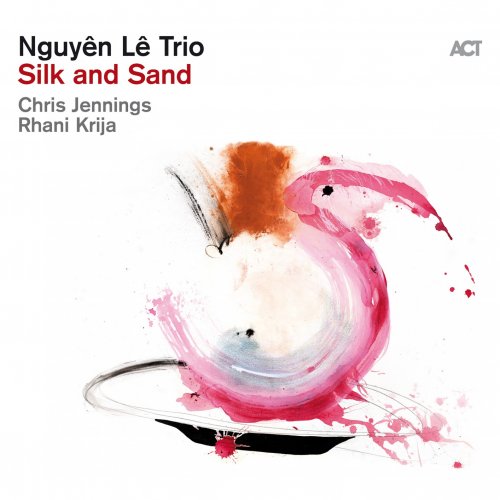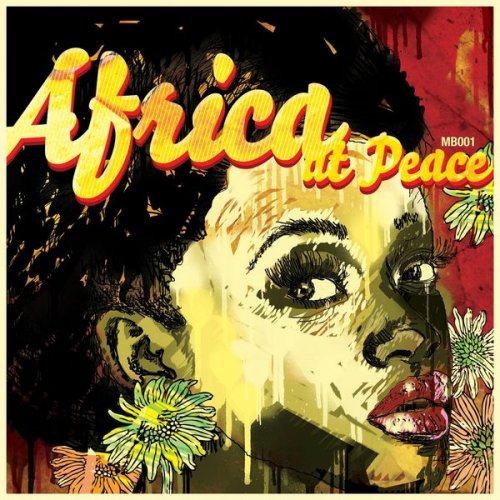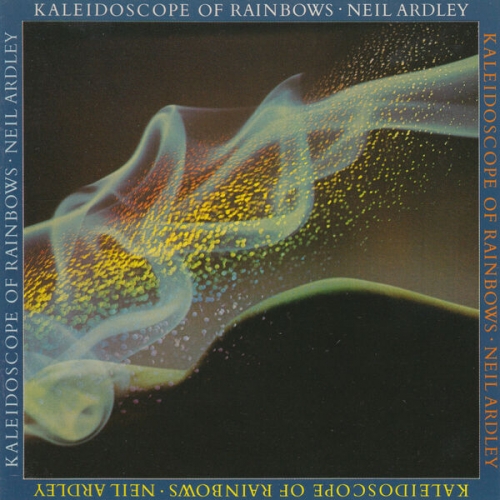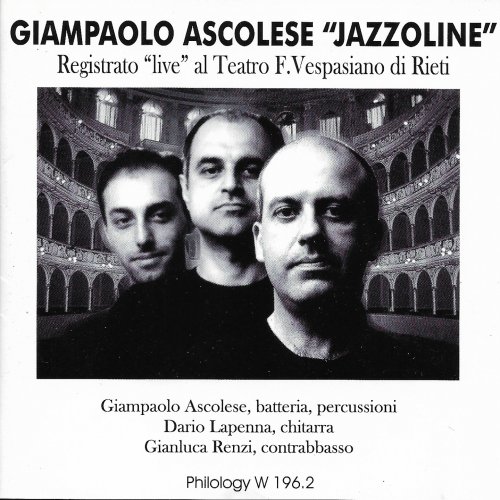Nguyên Lê - Silk and Sand (2023) [Hi-Res]

Artist: Nguyên Lê
Title: Silk and Sand
Year Of Release: 2023
Label: ACT Music
Genre: Jazz, Fusion
Quality: Mp3 320 kbps / FLAC (tracks) / 24bit-88.2kHz FLAC (tracks+booklet)
Total Time: 48:47
Total Size: 120 / 283 / 935 MB
WebSite: Album Preview
Tracklist:Title: Silk and Sand
Year Of Release: 2023
Label: ACT Music
Genre: Jazz, Fusion
Quality: Mp3 320 kbps / FLAC (tracks) / 24bit-88.2kHz FLAC (tracks+booklet)
Total Time: 48:47
Total Size: 120 / 283 / 935 MB
WebSite: Album Preview
1. Red City (4:44)
2. Silk and Sand (6:01)
3. Onety-One (5:44)
4. Moonstone (6:26)
5. The Waters of Ortiglia (5:06)
6. Baraka (4:44)
7. Thar Desert Dawn (6:19)
8. Tiger's Dance (3:58)
9. Becoming Water (5:49)
Since guitarist Nguyên Lê became the first exclusive ACT artist thirty years ago, he has established himself as a distinctive voice of his instrument. And as one of the most important representatives of jazz as world music without borders. The 64-year-old is one of the few whose technique, style and composition are unique and recognizable from the first note - a mastery in the true sense of the word. With "Silk and Sand" Lê now returns to the format of the trio with which he once began his career as a leader on "Million Waves".
Lê was self-taught as a musician. He started out on the drums, only switching to guitar later. His academic studies were in fine art and philosophy, and it was only thereafter that he embarked on a career in music. His artistry, therefore, defines itself as being not of any particular school – he has developed very much according to his own precepts – and he also has cultural horizons which extend far beyond music. Another important principle with Lê is that he has always seen himself as a builder of bridges between genres, styles and continents. "I am the fusion of cultures personified," he says. Lê is a world musician in the most authentic sense, in whom European – and especially French – musical culture has always found a meeting-place with his Southeast Asian roots, and he combines these not just with American traditions of jazz and rock, but also with music from other continents. From his first, strongly Afro-Caribbean band, Ultramarine, his journey has taken him through albums like "Zanzibar", "Tales from Vietnam", then involved his participation in the groundbreaking neo-flamenco project "Jazzpaña", his collaboration with the traditional Vietnamese singer Huong Thanh, the trio E_L_B with Peter Erskine, and his multiple-award-winning Jimi Hendrix project.
In the wake of a number of global fusion and rock ventures in recent years with international stars, "Silk and Sand" marks a return to the roots. Here we find a more refined and quieter kind of music-making, as the title implies, and also with more jazz in the mix. Lê also points out the connections with his earlier work: "On my album 'Three Trios' from 1996, I called two of the pieces "Silk" and "Sand": silk is precious and yet strong and it weaves the musicians' interplay together; the sand of the desert haunts the musician's dreams of other places. Twenty-six years later, these tracks are like pebbles on the path, and they are still there."
But Nguyên Lê would not be himself if he were to rely only on the ingredients of a classical jazz line-up for a new trio. He chose Moroccan percussionist Rhani Krjia for the rhythm section, a musical soul mate with whom Lê wanted to work since years and whose subtle, colorful grooves have already enriched the music of stars such as Sting, Keziah Jones or Dominic Miller. The strong musical foundation of trio is provided by Canadian Chris Jennings, a long-time collaborator with Lê and one of the most sought-after bassists on both sides of the Atlantic.
The title track, or indeed "Thar Desert Dawn", exemplifies the magic between the three musicians: these melodies are full of passion and reach out into improvisations. Lê lays them down over the North African rhythms of Rhani Krija and the massive but singing bass sound of Chris Jennings. The opening album track "Red City" is a wild, dynamic ride into the hustle and bustle of Asian or African cities, complete with urgent, clamorous voices. It gets rockier for "Onety-One" and especially on "Tiger's Dance", and then calmer for the hymn-like "Moonstone" and "The Waters of Ortigia", with a melody that unfolds slowly and deliciously. "Baraka" is strongly influenced by funk-infused African rhythms and has a teasing intro from Rhani Krija on the gimbri, and the final "Becoming Water" brings together the melodies and timbres of the Maghreb and Southeast Asia in an irresistible and touching way.
The core trio with Jennings and Rhani is joined for two of the more elegiac pieces by Sylvain Barou on bansuri and duduk flutes, and by Miron Rafajlovic, who plays trumpet and flugelhorn on "Moonstone". The return to Lê's beginnings as an inspiration for new ideas is made clear by another of the guests appearing on "Silk and Sand": Etienne Mbappé delivers a stupendous electric bass solo on "Baraka". The Cameroonian, who became widely known for his work with Joe Zawinul, John McLaughlin Salif Keïta and others, was already a member of Lê's first band Ultramarine. Thus, in an irresistible and enjoyable way, Lê's "Silk and Sand" doesn’t just – as ever – build bridges between Asia, Africa and Europe, and between jazz, rock and world music….but also between past, present and future.
Nguyên Lê / guitars, synths, vocals
Chris Jennings / acoustic bass
Rhani Krija percussion / gumbri, vocals
Lê was self-taught as a musician. He started out on the drums, only switching to guitar later. His academic studies were in fine art and philosophy, and it was only thereafter that he embarked on a career in music. His artistry, therefore, defines itself as being not of any particular school – he has developed very much according to his own precepts – and he also has cultural horizons which extend far beyond music. Another important principle with Lê is that he has always seen himself as a builder of bridges between genres, styles and continents. "I am the fusion of cultures personified," he says. Lê is a world musician in the most authentic sense, in whom European – and especially French – musical culture has always found a meeting-place with his Southeast Asian roots, and he combines these not just with American traditions of jazz and rock, but also with music from other continents. From his first, strongly Afro-Caribbean band, Ultramarine, his journey has taken him through albums like "Zanzibar", "Tales from Vietnam", then involved his participation in the groundbreaking neo-flamenco project "Jazzpaña", his collaboration with the traditional Vietnamese singer Huong Thanh, the trio E_L_B with Peter Erskine, and his multiple-award-winning Jimi Hendrix project.
In the wake of a number of global fusion and rock ventures in recent years with international stars, "Silk and Sand" marks a return to the roots. Here we find a more refined and quieter kind of music-making, as the title implies, and also with more jazz in the mix. Lê also points out the connections with his earlier work: "On my album 'Three Trios' from 1996, I called two of the pieces "Silk" and "Sand": silk is precious and yet strong and it weaves the musicians' interplay together; the sand of the desert haunts the musician's dreams of other places. Twenty-six years later, these tracks are like pebbles on the path, and they are still there."
But Nguyên Lê would not be himself if he were to rely only on the ingredients of a classical jazz line-up for a new trio. He chose Moroccan percussionist Rhani Krjia for the rhythm section, a musical soul mate with whom Lê wanted to work since years and whose subtle, colorful grooves have already enriched the music of stars such as Sting, Keziah Jones or Dominic Miller. The strong musical foundation of trio is provided by Canadian Chris Jennings, a long-time collaborator with Lê and one of the most sought-after bassists on both sides of the Atlantic.
The title track, or indeed "Thar Desert Dawn", exemplifies the magic between the three musicians: these melodies are full of passion and reach out into improvisations. Lê lays them down over the North African rhythms of Rhani Krija and the massive but singing bass sound of Chris Jennings. The opening album track "Red City" is a wild, dynamic ride into the hustle and bustle of Asian or African cities, complete with urgent, clamorous voices. It gets rockier for "Onety-One" and especially on "Tiger's Dance", and then calmer for the hymn-like "Moonstone" and "The Waters of Ortigia", with a melody that unfolds slowly and deliciously. "Baraka" is strongly influenced by funk-infused African rhythms and has a teasing intro from Rhani Krija on the gimbri, and the final "Becoming Water" brings together the melodies and timbres of the Maghreb and Southeast Asia in an irresistible and touching way.
The core trio with Jennings and Rhani is joined for two of the more elegiac pieces by Sylvain Barou on bansuri and duduk flutes, and by Miron Rafajlovic, who plays trumpet and flugelhorn on "Moonstone". The return to Lê's beginnings as an inspiration for new ideas is made clear by another of the guests appearing on "Silk and Sand": Etienne Mbappé delivers a stupendous electric bass solo on "Baraka". The Cameroonian, who became widely known for his work with Joe Zawinul, John McLaughlin Salif Keïta and others, was already a member of Lê's first band Ultramarine. Thus, in an irresistible and enjoyable way, Lê's "Silk and Sand" doesn’t just – as ever – build bridges between Asia, Africa and Europe, and between jazz, rock and world music….but also between past, present and future.
Nguyên Lê / guitars, synths, vocals
Chris Jennings / acoustic bass
Rhani Krija percussion / gumbri, vocals

![Bobby Hutcherson - Components (1965) [LP] Bobby Hutcherson - Components (1965) [LP]](https://www.dibpic.com/uploads/posts/2026-02/1770471883_front.jpg)



![James Fernando - Philly 3 (2026) [Hi-Res] James Fernando - Philly 3 (2026) [Hi-Res]](https://img.israbox.com/img/2026-02/06/x1z1d5tgfw7831grgh5do6jls.jpg)


